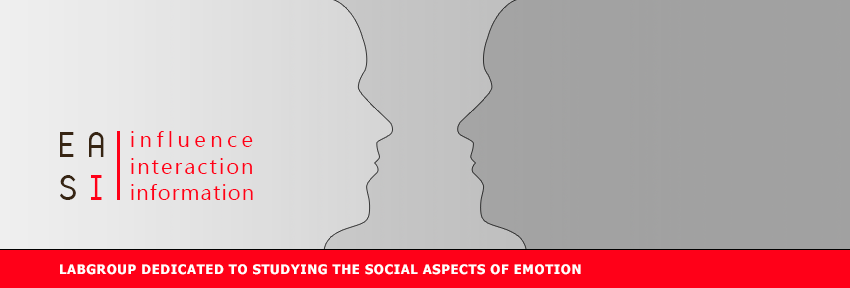Social situations often require some form of emotion regulation. For instance, people may be motivated to regulate their emotional expressions because certain emotions might be inappropriate under the circumstances and therefore have adverse consequences. Relatedly, people may strategically manage their emotional expressions with an eye on obtaining certain outcomes, such as making a favorable impression or securing a good deal in a negotiation. We study the effects of different emotion regulation strategies on observers’ responses and resulting outcomes. We also investigate how people regulate the emotions of others. Such interpersonal emotion regulation may happen for prosocial reasons (e.g., to make the other feel better or help them perform) or for more selfish reasons (e.g., to benefit from the other’s emotional state). We seek to understand what drives people to regulate their own and others’ emotions and how they go about doing so.
Sample publications:
Pauw, L. S., Sauter, D. A., Van Kleef, G. A., & Fischer, A. H. (2019). Stop crying! The impact of situational demands on interpersonal emotion regulation. Cognition and Emotion, 33, 1587-1598.
Netzer, L., Van Kleef, G. A., & Tamir, M. (2015). Interpersonal instrumental emotion regulation. Journal of Experimental Social Psychology, 58, 124-135.
Van Dijk, E., Van Beest, I., Van Kleef, G. A., & Lelieveld, G.-J. (2018). Communication of anger versus disappointment in bargaining, and the moderating role of power. Journal of Behavioral Decision Making, 31, 632-643.
Côté, S., Hideg, I., & Van Kleef, G. A. (2013). The consequences of faking anger in negotiations. Journal of Experimental Social Psychology, 49, 453-463.
Bechtoldt, M. N., Beersma, B., & Van Kleef, G. A. (2019). When (not) to empathize: The differential effects of combined emotion recognition and empathic concern on client satisfaction across professions. Motivation and Emotion, 43, 112-129.
Hideg, I., & Van Kleef, G. A. (2017). When expressions of fake emotions elicit negative reactions: The role of observers’ dialectical thinking. Journal of Organizational Behavior, 38, 1196-1212.

